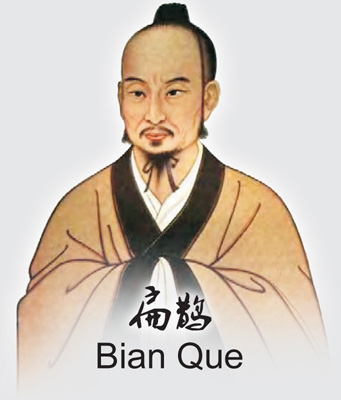
One famous legend tells of how once when Bian Que was in the State of Cai, he saw the lord of the state at the time and told him that he had a disease, which Bian Que claimed was only in his skin. The lord brushed this aside as at that time he felt no symptoms, and told his attendants that Bian Que was just trying to profit from the fears of others. Bian Que is said to have visited the lord many times thereafter, telling him each time how this sickness was becoming progressively worse, each time spreading into more of his body, from his skin to his blood and to his organs. The last time Bian Que went to see the lord, he looked in from afar, and rushed out of the palace. When an attendant of the lord asked him why he had done this, he replied that the disease was in the marrow and was incurable. The lord was said to have died soon after.
Another legend stated that once, while visiting the state of Guo, he saw people mourning on the streets. Upon inquiring what their grievances were, he got the reply that the heir apparent of the lord had died, and the lord was in mourning. Sensing something afoot, he is said to have gone to the palace to inquire about the circumstances of the death. After hearing of how the prince "died", he concluded that the prince had not really died, but was rather in a coma-like state. He set a single acupuncture needle in the Baihu point on the head, helping the prince to regain consciousness. Herbal medicine was boiled to help the prince sit up, and after Bian Que prescribed the prince with more herbal medicine, the prince healed fully within twenty days.
Bian Que advocated the four-step diagnoses of "Looking (at their tongues and their outside appearances), Listening (to their voice and breathing patterns), Inquiring (about their symptoms), and Taking (their pulse)."
Bian Que suggests exchanging the hearts of the two to attain balance. Upon hearing his opinion, the patients agree to the procedure. Bian Que then gives the men an intoxicating wine that makes them "feign death" for three days. While they are under the anesthetic effects of this concoction, Bian Que "cut open their breasts, removed their hearts, exchanged and replaced them, and applied a numinous medicine, and when they awoke they were as good as new."



